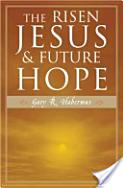Over the past two weeks we have discussed the objections levied against the objectivity of history by the historical relativists. While the outlook for the knowability of history may look bleak at this point, the door is by no means shut on this question. Problems abound within the arguments postulated by historical subjectivists, and over the next two weeks we will focus our attention on answering the objections raised by the historical relativists. In the end, both the knowability of history and the historicity of Christianity will be vindicated.
Response to the Epistemological Objections
In seeking to deconstruct the assertions made by those who argue that history is not knowable an elementary mistake in reasoning becomes apparent. How can the relativist really know that everyone's knowledge of history is not objective unless one had an objective knowledge of it, by which they could determine that all other views were in fact not objective? As a result, it is not difficult to see that the basic premise of the relativist's entire argument is self-defeating. It does not pass its own standard for determining truth. One cannot claim that objective history is not possible without also asserting to have an objective knowledge of history.
Response to the Problem of Unobservability of Historical Events
How one defines the word objective is very important in answering those who doubt that history can be objectively known. If by objective one means absolute knowledge, then no human historian writing under his own power can be objective. However, if objective means an accurate and adequate presentation that reasonable men and women should accept, then the door is open to the possibility of objectivity.(1)
If one accepts the latter definition presented above, than history is no less objective than some of the other so-called empirical sciences. For example, paleontology or historical geology, a science which deals with physical facts and processes of the past, is widely considered one of the most objective of all the sciences.(2) This is somewhat curious since the events represented by the fossil record are no more observable or repeatable than historical events are for the historian. Dr. Norman Geisler offers the following assessment of the situation:
The fossil is a mechanically true imprint of the original event and the eyewitness of history may be less precise. But natural processes also can mar the fossil imprint. At least if one can determine the integrity and reliability of the eyewitness, one cannot slam the door on the possibility of objectivity in history any more than on objectivity in geology.(3)
A scientist might counter that the processes of the past can be repeated by experimentation in the present whereas historical events cannot. Once again this argument is not entirely correct since we have shown earlier that while God is advancing history forward in linear fashion towards its prophesied end, cyclical patters do occur along history's linear plane. Therefore, history does repeat itself to some degree. "In short, the historian no less that the scientist, has the tools for determining what really happened in the past. The lack of direct access does not hinder one more than the other."(4)
Finally, it should be noted if either the historian or the geologist takes "fact" to mean the original event than neither possess any facts. As a result, "fact" must be taken to mean information about the original event and as such they are not the subjective imaginations of the historian. Facts are objective data whether anyone reads them or not. Consequently, there remains both for science and history a sold core of objective facts because whatever meaning or interpretation one chooses to ascribe to the facts, the data is not eliminated. In fact, if there where no objective historical facts, one could not distinguish between good history and propaganda.(5) Geisler offers the following summation of this point:
If history is entirely in the mind of the beholder, there is no reason one cannot decide to behold it in any way he desires. In this case there would be no difference between good history and trashy propaganda. But historians, even historical subjectivists recognize the difference. Hence, even they assume an objective knowledge of history.(6)
Response to the Problem of Fragmentary Accounts
The fact that the historical record is fragmentary does not render history unknowable anymore than the fragmentary nature of the fossil record destroys the objectivity of geology. Fossils, like primary sources, represent only a small percentage of the history of all living things. However, this does not keep the geologist from reconstructing a picture of what happened in the past based upon the fossils available in the present. How is this different from the process of writing history? In fact, geologists have been known to reconstruct entire animals and people from only a single bone. One should not be quick to demand that every piece be present before reconstruction is attempted. If one possess key pieces of evidence reconstruction can occur with a measurable degree of probability.(7) "For example, by the principle of bilateral similarity one can assume that the left side of a partial skull would look like the right side that was found."(8)
Despite the recent controversy, history like science is subject to revision only if the discovery of new facts warrants a reinterpretation of events. New finds may provide new facts which call for new interpretations. Consequently, interpretations can neither create facts nor can they ignore them if they wish to remain objective. Therefore, one can conclude that history is not any less objective than geology simply because it depends upon fragmentary accounts.(9) "Scientific knowledge is also partial and depends upon assumptions and an overall framework which may prove to be inadequate upon the discovery of more facts."(10)
In conclusion to this point, consider the following summation by Dr. Geisler. He writes:
Whatever difficulty there may be, from a strictly scientific point of view, in filling the gaps between facts, once one has assumed a philosophical stance toward the world, the problem of objectivity in general is resolved. If there is a God, then the overall picture is already drawn; the facts of history will merely fill in the details of its meaning. If the universe is theistic, the artist's sketch is already known in advance; the detail and coloring will come only as all the facts of history are fit into the overall sketch known to be true from the theistic framework. In the same sense historical objectivity is most certainly possible within a given framework such as a theistic worldview. Objectivity resides in the view that best fits the facts consistently into an overall theistic system which is supported by good evidence.(11)
Response to the Axiological (Value) Objection
Just because everyday language is laden with value judgments does not automatically eliminate the possibility of writing objective history. Objectivity means to be fair in how one deals with the facts; it means to present what occurred in the past as accurately as possible. Furthermore, objectivity means that when the historian interprets why events unfolded as they did, language should ascribe to these events that value they had in their original context. When this is accomplished objectivity is achieved. When viewed in this fashion, historical objectivity demands the making of value judgments. The real question here is not whether value language can be objective but rather whether value statements objectively portray the events the way they really occurred.(12) According to Geisler, "Once the worldview has been determined, value judgments are not undesirable or merely subjective; they are, in fact, essential and objectively required. If this is a theistic world, then it is not objective to place anything but a proper theistic value on the facts of history."(13)
Response to the Methodological Objections
Historical objectivity is not canceled out simply because every historian must employ a methodology when composing history.
Response to the Problem of Historical Conditioning
Every human being does occupy a relative place in the changing events of the spatio-temporal world. As a result, in at least a limited sense, each historian is a product of his time. However, it does not follow that because the historian is a product of his time; his history is also purely a product of the time. Just because a person cannot avoid their relative place in history does not mean they cannot achieve a meaningful degree of objectivity. This objection confuses the content of knowledge and the process one uses in attaining it.(14)
Moreover, if relativity were inevitable, historical relativism is self-defeating, because this view would either be historically conditioned and therefore unobjective or it is not relative but objective. If the latter is correct, the historical relativist must admit that objective history is possible. On the other hand, "if the position of the historical relativism is itself relative, it cannot be taken as objectively true—it is simply subjective opinion."(15) In summary, "if it is a subjective opinion it cannot eliminate the possibility that history is objectively knowable, and if it is an objective fact about history, then objective facts can be now about history."(16) The bottom line is that objectivity is possible, if the first seneario is true objectivity is not eliminated and in the second relativism is self-defeated.(17)
In the end, is not the constant historical revisionism undertaken by modern historian predicated on the assumption that objectivity is possible? In short, there is no basis for doubting the possibility of a high degree of historical objectivity.
Response to the Problem of Selectivity of Materials
Every day in the United States jurors make judgments about the guilt or innocence of their fellow citizens "beyond reasonable doubt" without having all the evidence. One need not know everything in order to know something. No scientist possesses all the facts yet objectivity is routinely claim and applauded. As long as the historian considers the relevant and critical evidence without overlooking important facts, history is no less objective than science. What is necessary is that facts be selected and reconstructed within the context in which the events represented actually transpired. Selectivity is necessary because no historian can account for everything available on a particular subject. As a result, selectivity does not imply distortion.(18)
In the end, since the evidence for the historicity of the New Testament is greater than for any other document from antiquity, it could easily be argued that if the events recorded in Scripture cannot be objectively known, then it is impossible to know anything else from that time period.(19)
Endnotes:
- Norman Geisler. Baker Encyclopedia of Christian Apologetics. (Grand Rapids, MI: Baker Books, 1999), 323.
- Ibid., 323.
- Ibid., 324.
- Norman Geisler. Systematic Theology: Volume One. (Minneapolis, MN: Bethany House, 2002), 190.
- Ibid., 190-191.
- Ibid., 191.
- Ibid., 191.
- Ibid., 191.
- Geisler. Baker Encyclopedia of Christian Apologetics, 324.
- Ibid., 324.
- Ibid., 325.
- Geisler. Systematic Theology: Volume One, 192.
- Ibid., 192.
- Ibid., 192.
- Ibid., 193.
- Ibid., 193.
- Ibid., 193.
- Ibid., 193.
- Ibid., 193.


























No comments:
Post a Comment